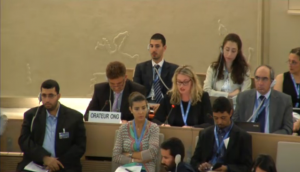
The British Humanist Association (BHA) has called for the end to the global persecution of non-believers and religious non-conformists and a move to a total separation of religion and the state at the 30th regular session of the United Nations Human Rights Council (UNHRC).
In the first of two statements to the UNHRC, BHA representative, Cordelia Tucker O’Sullivan reminded the Council that non-religious people are routinely persecuted, both by states and religious extremists, in places such as Saudi Arabia and Bangladesh.
Ms Tucker O’Sullivan highlighted the plight of freethinker Raif Badawi, who continues to be imprisoned and lashed for ‘criticising Islam’. Raif’s case has received attention from organisations such as Amnesty International and various international media outlets, but Saudi Arabia has neither released him nor reduced his sentence. Raif Badawi’s lawyer, Waleed Abu Al-Khair was also charged and convicted under Saudi Arabia’s new ‘anti-terrorism’ decree for his work as a human rights activist.
In its statement, the BHA again drew attention to the human rights abuses directed towards humanist bloggers in Bangladesh, and in particular, to the murders of Avijit Roy, Washiqur Rahman, Ananta Bijoy Das, and Niloy Neel, who were all on an ‘atheist hit list’ provided to the government of Bangladesh by Islamist extremists in 2013. Most of the remaining bloggers on the hit list have either fled Bangladesh or are in hiding, out of fear for their lives.
In concluding, the BHA quoted the Oxford Declaration of Freedom of Thought and Expression, passed by the World Humanist Congress in 2014, reminding the UNHRC that ‘freedom of thought and expression “have proved the most essential conditions for human flourishing”’. Ms Tucker O’Sullivan urged the Council to put pressure on the relevant states to amend their legal codes and practices in order to promote and protect the rights of all its citizens.
In the second of two statements to the UNHRC, Ms Tucker O’Sullivan told the assembled nations that a secular state is ‘the only arrangement which is consistent with the fulfilment of the right to freedom of conscience for all’, as enshrined in article 18 of the Universal Declaration of Human Rights, but that it is often regarded with ‘suspicion, fear, and considered in ignorance’.
Ms Tucker O’Sullivan went on to note that a non-secular state is ‘not only conceptually inconsistent with the right to freedom of religion or belief but… is often accompanied by discriminatory legal codes’, using Egypt and the UK as examples of when this occurs.
In Egypt, where Islam is the state religion, atheists have been demonised via a state-sponsored anti-atheism campaign. Ms Tucker O’Sulivan highlighted where Egypt has failed to challenge extra-judicial violence committed against non-believers, such as that directed against Ahmad and Saly Al-Harkan, who were the subjects of a failed assassination attempt, following Ahmad’s public discussions of atheism in the media. She also highlighted the grave situation in Morocco, whose constitution outlaws advocacy of secularism as well as the formation of humanist and secular groups, and where the criminal code treats lesbian, gay, and bisexual Moroccans as criminals, handing down prison sentences for acts of homosexuality.
The BHA concluded by urging the UNHRC to ‘move towards a total separation between the state and religion, and pressure those states which commit particularly grave violations in the name of religion to curb these abuses and respect the rights of their freethinking citizens.’
Notes
For further comment or information contact Pavan Dhaliwal, Director of Public Affairs and Campaigns at pavan@humanists.uk or on 0773 843 5059.
The British Humanist Association is the national charity working on behalf of non-religious people who seek to live ethically and fulfilling lives on the basis of reason and humanity. It promotes a secular state and equal treatment in law and policy of everyone, regardless of religion of belief.
